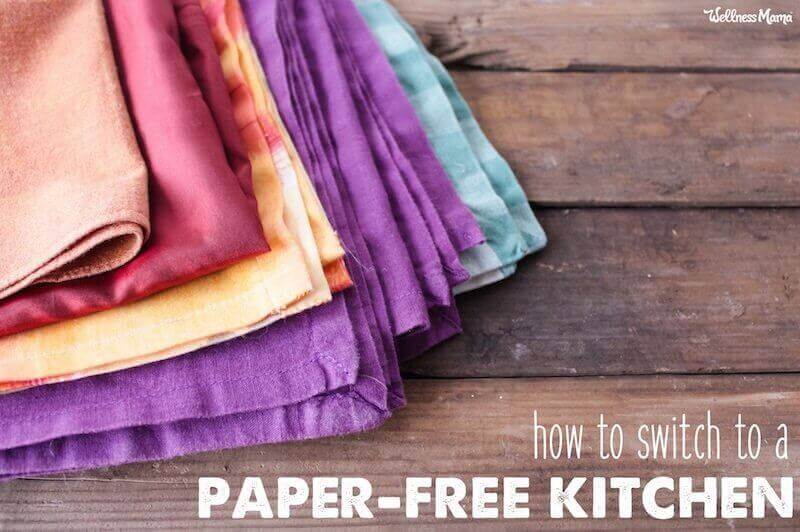One simple change in the kitchen can make a big difference in reducing waste and saving money: switching to entirely to cloth instead of paper.
This is one easy change that I resisted for a long time but wish I had made the switch much earlier. I think the idea of removing paper products in the kitchen is much more daunting than it actually is to switch.
I have many friends who cloth diaper but who still resist the idea of using cloth instead of paper towels and napkins in the kitchen (kitchen messes are less gross than poopy diapers in my opinion… at least most of the time!).
If you’ve never considered the idea of using cloth in the kitchen before, I’d encourage you to give it a try. Not only does it save money and reduce waste, but I actually find that it isn’t much extra work at all (and we cook 3x a day).
What Kind of Cloth?
I think the two biggest factors that make using cloth in the kitchen easy for us are:
- Picking the right kind of cloth
- Having enough of them on hand
To go paper-free in the kitchen, you have to replace paper napkins, paper towels, and other disposable products like cleaning wipes. I’ve found that there isn’t necessarily a single solution that replaces all of these, but that there are very effective replacements for each category.
Paper Napkins Cloth Napkins
We actually had a big supply of cloth napkins already since we bought them instead of renting them when we got married (It was a lot cheaper!) They were all white though and have gotten stained over the years, so I’ve occasionally replaced some of them with colorful napkins like these or mismatched ones from thrift stores and yard sales.
Paper Towels Huck Towels
Hypothetically, all paper products could be replaced by huck towels if you didn’t mind how they look as napkins. I’ve found that they are more absorbent than paper towels or regular napkins and surprisingly easy to use.
If you haven’t heard of huck towels before, I can’t recommend them enough. We got a few from a friend for our wedding and I searched for years in home stores and couldn’t find them. Then, I noticed them in an odd place: in the hospital! Turns out that these are the type of towels they use in the hospital for absorbing blood and other fluids during/after surgery.
You can order huck towels online and they work wonderfully as regular kitchen towels and in place of paper towels.
Setting up the System
If you’re just switching to a paper-free kitchen, setting up a good system for using cloth greatly simplifies things. I have cloth napkins, cotton rags, and huck towels in easily accessible places around the kitchen so that even the kids can use them. I also have a place where used towels go so they can be washed.
We keep cloth napkins by the table in a cabinet and huck towels and cotton rags in a drawer by the sink.
The kids are responsible for setting the table before meals and cleaning up after so I’ve made sure that they can easily reach the napkins and cleaning cloths to clean the table after meals. When they are done, used cloths go into a small basket under the sink. With our family size, I’ve found it helpful to have on hand:
- 2 dozen or more huck towels
- 1 dozen cotton dishcloths
- 3-4 dozen cloth napkins
- Other assorted cloths for cleaning and picking up spills including cut up old shirts, old cloth diapers/inserts or old socks (for younger kids to use in cleaning and polishing)
The assorted other cloths are especially helpful when cleaning up oil, paint, and other non-washable spills where it is easier to just throw the cloth away.
The Laundry Aspect
My biggest hesitation in switching to cloth was the extra laundry, but just as with cloth diapering it really isn’t a big deal once you get in the habit. I’ve found a few tips that have made things easier though:
- Run a rinse cycle with some baking soda first to cut any grease
- Run an extra rinse cycle with vinegar at the end if needed for extra cleaning/deodorizing.
- Using this BioKleen oxybleach or Branch Basics oxyclean occasionally to get rid of stains or odor (I also use this on cloth diapers sometimes also)
- Wash every other day and teach younger kids to fold the loads (easy thing for them to learn how to fold)
The Savings
I wish that I had kept up with how much we spent on paper products for the kitchen when we used them so I could give a good estimate for how much we save. Maybe some of you can chime in below with averages of how much you spend on paper products.
Of course, if you can’t quite give up paper towels in the kitchen (and no judgment here, I haven’t switched to cloth toilet paper and probably never will!) there are recycled options from responsible companies that make these a better choice.
I do know that for under $60 you can get a good supply of all of the cloth replacements for paper products in your kitchen, and based on the prices of paper products in the stores, I would think these would pay for themselves within a few months.
Do you use cloth in your kitchen? If not, would you consider making the switch? Let me know why or why not below!




Leave a Reply